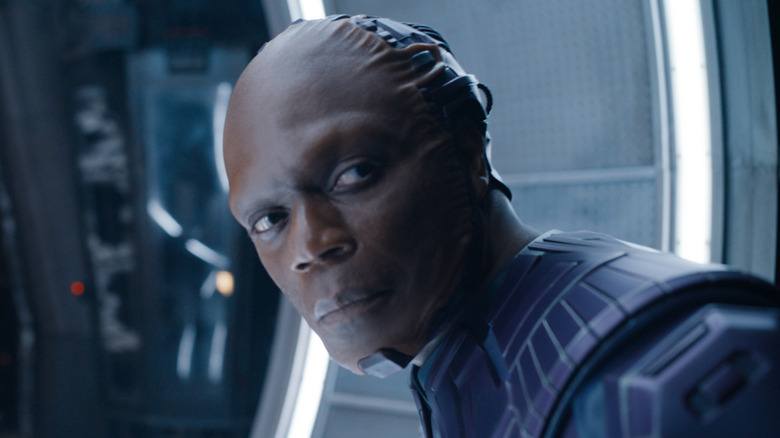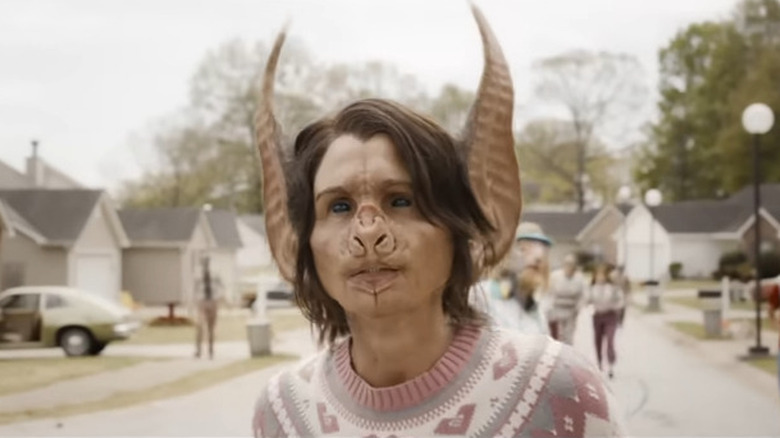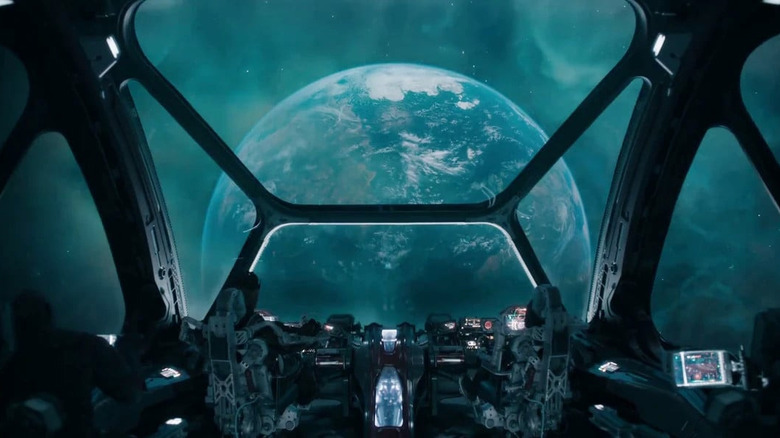Guardians Of The Galaxy Vol. 3 Has A Man Of Steel Problem
The two primary features of James Gunn's multiple "Guardians of the Galaxy" projects are their quirkiness and their unabashed sentimentality. To assure the former, Gunn made his title team a group of weirdo outsiders who are all possessed of a playfully semi-ignorant, devil-may-care attitude that communicated a flip irreverence toward the Marvel Cinematic Universe, a series usually bogged down by overtly earnest mythmaking. On the other side of things, the outsider characters were, over the course of their multiple appearances, careful to tell each other about their respective trauma and issues with abusive fathers. The Guardians, then, didn't merely come together as a team, but emerged as a found family, holding each other for mutual warmth.
The Guardians movies, sadly, don't always strike a great balance between their flippant tone and their emotional leanings. The Guardians, as part of their job, kill enemy soldiers by the score and then are expected to sit and discuss how they rarely receive empathy.
This imbalance is especially sharp in "Guardians of the Galaxy Vol. 3," a sprawling 150-minute denouement to the Guardian's story that ups the emotional stakes, but also expands the violence. The emotional beats occasionally hit, but they are largely undone by the sheer scale of destruction on camera. One might recall Zack Snyder's 2013 film "Man of Steel" in this regard. That film's final fight was between Superman (Henry Cavill) and General Zod (Michael Shannon) in a destructive conflagration that almost lays waste to downtown Metropolis. The film never stops to assess the destruction, and it appears that Superman feels no compunction about the mass death he is personally responsible for.
"Vol. 3" climaxes with the destruction of an entire planet. It doesn't pause to mourn.
Counter-Earth
The villain of "Guardians of the Galaxy, Vol. 3" is a mad scientist called the High Evolutionary (Chukwudi Iwuji), a man obsessed with eugenics. For an unspecified amount of time, he has been building an exact replica of Earth out in the cosmos that he calls Counter-Earth. His plan is to use surgery and a high-tech evolution chamber to create a race of anthropomorphic animal people that will live on Counter-Earth in complete peace and prosperity. By the time the Guardians catch up with the High Evolutionary, Counter-Earth is already living through the 21st-century phase of its development.
At first, the animal people seem placid and friendly, and the Guardians are housed by a gentle bat woman who serves them drinks and lends them her family car. Immediately after, however, the Guardians drive into town and find that crime and drugs are rampant among the animal people and that society appears to be afflicted with as much violence and strife as many modern cities on Earth. When the High Evolutionary learns from the Guardians that his model society is failing, he resolves to incinerate the planet and start again.
The High Evolutionary flees in his creepy, medical spacecraft, just as Counter-Earth begins exploding from within. There is no talk of evacuating the planet, so it seems that the animal people who live on it — presumably billions of them — are all going to die.
One might think that, at the very least, Rocket Raccoon (Bradley Cooper), himself a result of the High Evolutionary's genetic tinkering, would pause to reflect on the mass death in front of him. Instead, the Guardians focus on apprehending the villain instead. Did I mention that billions of intelligent beings just died?
Piff. It's only morality.
One might have to do a little mental stretching to justify the Guardians' neglect. Perhaps the High Evolutionary's animal society was only a few weeks old and had been artificially accelerated in some way so that it would resemble modern Earth. That would mean the animal people hadn't organically formed their own Earth-like society but were mentally programmed to playact inside of one. And if they were merely remote-controlled meat bots without any free will, perhaps the Guardians can be forgiven for not being wholly attached to them — although that doesn't make their murders any more ethical. It will be the small number of cute humanoid children they encounter later in the film that really matters.
Or perhaps director James Gunn wanted the villain to do something hideously villainous that would further warrant his comeuppance. Whatever the creative decision, worry not. The Guardians will get him.
But these are all conceptual calisthenics. The truth of the matter is the destruction of Counter-Earth forms a curious compassion black hole in the middle of "Guardians of the Galaxy Vol. 3." In a film that is ostensibly about empathizing with all beings — no matter how weird, wounded, or dejected — it doesn't bother shed a single tear for a massive act of on-camera genocide. "Vol. 3" is a film that wants us to see a test animal as a victim worthy of saving, and then turns around and guns down multiple other said animals merely because they are "enemy combatants." Are the Guardians gentle and empathetic, or are they wisecracking, gun-toting badasses?
Gunn is eager to have his cake and eat it too. He wants sentimental gentleness, but also the dismissive attitude of a violent clown. Both elements work in turn, but they rarely work together.


